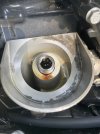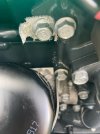Hello,
I noticed that the ground wire mount in my outboard has corrosion on it. It appears to be falling/dripping down onto the oil filter platform and corroding that as well.
I looked all around in the outboard and find no other issues, and there is no corrosion on either of the battery terminals or anywhere else in the boat's electrical system that I can find.
Any ideas on what is causing this or know how I can fix this? My fear is that it is slowly destroying the oil filter area and everything below it.

I noticed that the ground wire mount in my outboard has corrosion on it. It appears to be falling/dripping down onto the oil filter platform and corroding that as well.
I looked all around in the outboard and find no other issues, and there is no corrosion on either of the battery terminals or anywhere else in the boat's electrical system that I can find.
Any ideas on what is causing this or know how I can fix this? My fear is that it is slowly destroying the oil filter area and everything below it.




